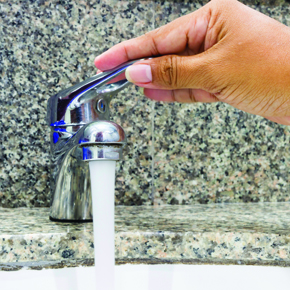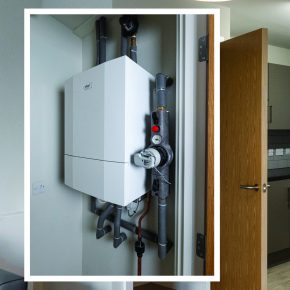
Building water efficient schools for the future
 Orchard Energy’s commercial director, Amar Hussain, provides hints and tips on what schools should be doing to help reduce water consumption and wastage…
Orchard Energy’s commercial director, Amar Hussain, provides hints and tips on what schools should be doing to help reduce water consumption and wastage…
Water supply in the UK is under increasing pressure; the population grows year-on-year with the effects of climate change and with shortages in rainfall escalating at a similar pace, crucial action needs to be taken to help sustain water reserves.
Careful consideration needs to be made when designing and maintaining schools to ensure the right water saving measures are in place to maximise efficiency. Knowing how to save and reuse water in order to keep water costs down to a minimum is fundamental. Simple solutions are frequently low cost and offer payback in less than a year, whereas higher cost (large capital) solutions will have an extended return on investment.
However, it’s more about reducing the amount of water used on site, rather than restricting it, as water is a vital part of living. Identifying where improvements can be made can lead to moderated consumption and great savings on water bills.
Schools vary greatly in size and naturally the number of people on site has impacts on water usage. Consider the amount of people that will flush a toilet on a daily basis or shower after a sports session; the number of flower beds that need watering or amount of windows that need cleaning. Combined with boilers that need heating and evaporative losses from pools, water wastage can be excessive which leads to expensive bills.
Rainwater harvesting is an effective, cheap and natural way to recycle water. If the school building is designed with a flat or pitched roof, a rainwater harvesting system can be installed. This simple, yet effective technology can help with irrigation but can also be used for flushing toilets. Alternatively, a water butt could be installed on site to collect rainwater, which could save around 2,400L per annum.
Try reducing water wastage. Simple, cost-effective installations, such as fitting push taps in kitchens, bathrooms and labs, where the time flow can be adjusted can help limit any water wastage. Flushsavers can also be fitted in all toilets, which can save on average 1.2 litres per flush. And don’t forget to check if showerheads are water efficient – replacing a 13L/min showerhead with an efficient 7.7L/min could save around £160 per annum.
Why not consider installing smart meters, which can keep a track of how much water is being used, giving precise readings, as well as helping to detect any leakages.
Regularly checking internal plumbing and outdoor water tools, such as sprinklers and hoses for leakages can also make a huge difference – a dripping tap wastes on average around 5,500L per annum. To prevent overflows make sure that washers and ball valves in cisterns are frequently inspected.
Try and encourage schools to achieve their own water reducing solutions. By engaging with schools, staff and students, helping them to understand the importance of water costs and empowering and incentivising them to make changes, this could lead to 5-10% cost savings with very low direct costs.
In 2008 the water market deregulated in Scotland allowing businesses and schools to switch and make savings on their bills simply by changing water suppliers. Deregulation of the non-domestic water market will come into effect in England in April 2017.
The water market in England has mostly operated as a series of regional monopolies, unlike other deregulated utility markets. This has often resulted in non household customers with multiple sites having to deal with a patchwork of different suppliers. With more than 22 water suppliers in operation across the country, this has led to non-standardised billing, dissatisfaction with customer service and high costs (money and time) in dealing with transactions.
Customers in Scotland already receive a better deal as a direct result of competition. Specialised utility management companies thoroughly review every component of water costs to make sure there are no overpayments. They make it simple to switch water supplier by handling the whole process, from finding the best price, to managing the changeover.
They can also give a detailed analysis of water and sewerage bills to ensure the tariff applied is the best available and will manage all other aspects of water services, providing a complete water solution, from managing site works, such as lead pipe replacement to finding and fixing leakages and tracing surveys.
It is important that schools start to monitor their water usage and implement water saving solutions. Maximising their water efficiency can help save significant amounts of money in the long term, improve their carbon footprint and help towards building water efficient schools of the future.
Read more in the latest issue of PSB Magazine
Latest news

28th April 2025
Nuaire first UK ventilation manufacturer to use low carbon-emissions recycled & renewably produced steel
Nuaire has announced that its Magnelis® steel based ventilations systems are now being made from XCarb® recycled and renewably produced steel.
Posted in Air Conditioning, Articles, Building Industry News, Building Products & Structures, Building Services, Building Systems, Heating, Ventilation and Air Conditioning - HVAC, Restoration & Refurbishment, Retrofit & Renovation, Steel and Structural Frames, Sustainability & Energy Efficiency, Waste Management & Recycling
28th April 2025
Renderplas: Builders avoid costly remedial work with PVCu render beads
A pioneer of PVCu render beads, Renderplas is helping the construction industry avoid the costly remedial work associated with rusting steel designs…
Posted in Articles, Building Industry News, Building Products & Structures, Building Services, Building Systems, Facades, Posts, Render, Restoration & Refurbishment, Retrofit & Renovation, Sustainability & Energy Efficiency, Walls
28th April 2025
How Celotex’s Technical Team adds value through expert insulation support
From U-value calculations to real-world installation support, Celotex’s technical team helps construction professionals specify and install insulation with confidence…
Posted in Articles, Building Industry News, Building Products & Structures, Building Services, Insulation, Research & Materials Testing, Restoration & Refurbishment, Retrofit & Renovation, Sustainability & Energy Efficiency, Walls
28th April 2025
Ideal Heating Commercial takes extra care with the heat network at Huddersfield specialist housing development
Ideal Heating Commercial POD Heat Interface Units (HIUs) and Evomax 2 condensing boilers have been installed into Ash View Extra Care in Huddersfield.
Posted in Articles, Building Industry News, Building Products & Structures, Building Services, Case Studies, Facility Management & Building Services, Heating Systems, Controls and Management, Heating, Ventilation and Air Conditioning - HVAC, Pipes & Fittings, Plumbing, Restoration & Refurbishment, Retrofit & Renovation
 Sign up:
Sign up: